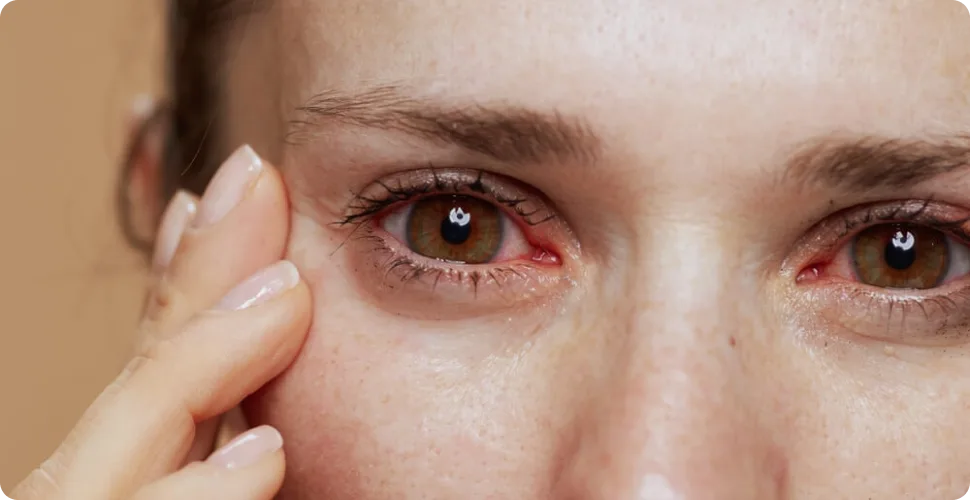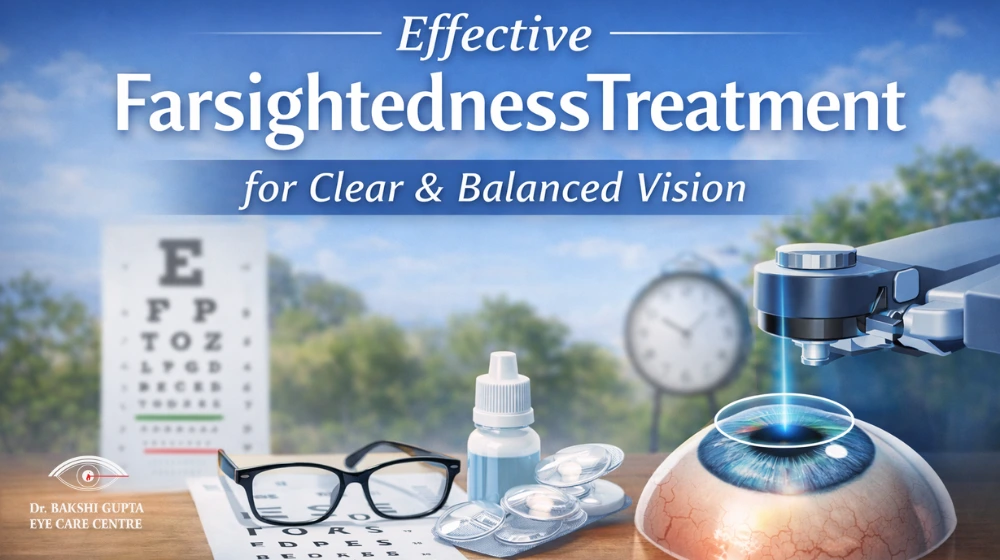Red itchy eyes are one of the most uncomfortable and distracting eye problems you can experience. Whether it’s caused by allergies, dryness, or infection, red itchy eyes can make it difficult to focus, drive, or even get a good night’s sleep. If you’ve ever rubbed your eyes due to irritation only to make them worse, you know how frustrating it can be.
In this detailed guide, we’ll explore the red itchy eyes causes, symptoms, and the most effective remedies for relief. You’ll also learn about when to see an eye specialist, how to prevent future irritation, and the best red and itchy eyes treatment options available today.
Understanding Red Itchy Eyes
When your eyes become red and itchy, it’s a clear sign that something is irritating the surface of the eye or the surrounding tissues. This condition may also involve eye redness and irritation, watering, swelling, or a burning sensation.
Your eyes are protected by a thin layer called the conjunctiva. When this layer becomes inflamed, you may develop red irritated eyes, which can result from a variety of causes — from mild allergies to serious infections.
Let’s dive deeper into what’s behind red itchy eyes and how you can manage it effectively.
Common Causes of Red Itchy Eyes
1. Allergies (Allergic Conjunctivitis)
One of the most common red itchy eyes causes an allergic reaction. Pollen, pet dander, dust mites, and mold are typical allergens that trigger inflammation in your eyes. When exposed to these allergens, your immune system releases histamines, leading to eye redness and irritation.
Symptoms include:
- Itchy, watery eyes
- Puffy eyelids
- Sneezing or nasal congestion
Tip: Avoid rubbing your eyes; it worsens inflammation. Instead, use cold compresses or antihistamine drops for relief.
2. Dry Eyes
When your eyes don’t produce enough tears, or the quality of tears is poor, dryness occurs. This leads to friction and irritation, causing itchy irritated eye symptoms.
You may experience:
- A gritty sensation in the eye
- Redness
- Blurred vision
Treatment options:
- Artificial tear drops
- Increasing humidity at home
- Taking regular breaks from screens
Chronic dry eyes should be evaluated by an eye specialist, such as one at an eye hospital in Panchkula, for proper diagnosis and long-term management.
3. Infections (Conjunctivitis or Pink Eye)
Bacterial or viral infections can lead to red irritated eyes. Viral infections are often linked to colds or flu, while bacterial infections can result in pus-like discharge and crusting.
Common symptoms:
- Sticky discharge
- Redness and swelling
- Sensitivity to light
Treatment:
- For viral infections: Artificial tears, cold compresses, and rest
- For bacterial infections: Antibiotic eye drops prescribed by a doctor
Avoid touching your eyes and wash your hands frequently to prevent spreading the infection.
4. Blepharitis (Inflammation of the Eyelids)
If your eyelids are red and itchy, you might be suffering from blepharitis. This occurs due to oil gland blockages near the eyelashes or bacterial overgrowth.
Symptoms:
- Flaky skin near the lashes
- Burning sensation
- Sticky eyelids upon waking
Remedy:
Clean your eyelids gently using diluted baby shampoo or a medicated eyelid cleanser. Warm compresses can also help loosen debris and unclog glands.
5. Contact Lens Irritation
Improper use of contact lenses can cause eye redness and irritation. Wearing lenses too long, not cleaning them properly, or using expired solution can irritate the eyes and make them itchy.
Preventive tips:
- Always wash hands before handling lenses
- Replace contact lenses as directed
- Avoid sleeping in lenses unless prescribed
If symptoms persist, discontinue lens use until your eyes heal.
6. Environmental Factors
External factors such as pollution, smoke, or chlorine from swimming pools can lead to red itchy eyes. These irritants damage the tear film and cause discomfort.
Prevention:
- Use protective eyewear outdoors
- Avoid smoky environments
- Rinse eyes with clean, lukewarm water after exposure
7. Digital Eye Strain
Spending hours on digital screens can reduce your blink rate, leading to dryness and itchy irritated eye symptoms.
Signs include:
- Blurred vision
- Headaches
- Tired or heavy eyes
Relief:
Follow the 20-20-20 rule: every 20 minutes, look at something 20 feet away for 20 seconds. Adjust screen brightness and maintain a proper viewing distance.
8. Foreign Objects and Eye Injury
Tiny particles like dust or sand can scratch your cornea, causing eye redness and irritation.
Immediate steps:
- Avoid rubbing your eyes
- Rinse gently with saline solution
- Seek medical help if the irritation persists
Effective Home Remedies for Red Itchy Eyes
When dealing with red itchy eyes, several home remedies can bring quick and safe relief. However, if symptoms last more than a few days, consult an eye specialist for proper evaluation.
1. Cold Compress
Applying a cold compress helps reduce swelling, itching, and redness. It’s especially beneficial for allergy-related red irritated eyes.
How to use:
- Soak a clean cloth in cold water
- Place it over closed eyes for 5–10 minutes
- Repeat 2–3 times daily
2. Cucumber Slices
Cucumbers have natural cooling and anti-inflammatory properties that soothe itchy irritated eye symptoms.
Steps:
- Chill cucumber slices in the refrigerator
- Place them over closed eyes for 10 minutes
- Repeat twice daily
3. Aloe Vera Gel
Aloe vera contains antioxidants and soothing compounds that reduce eye redness and irritation.
Usage:
- Dilute a small amount of aloe vera gel with water
- Soak a cotton pad in the mixture and place it over closed eyes for 10 minutes
4. Green Tea Bags
Green tea has anti-inflammatory and antihistamine effects that can ease red itchy eyes.
How to use:
- Steep tea bags in hot water
- Let them cool in the refrigerator
- Place over eyes for 10–15 minutes
5. Artificial Tears
Over-the-counter lubricating drops can instantly relieve dryness and provide long-lasting moisture for red irritated eyes.
Tip: Choose preservative-free formulations for sensitive eyes.
6. Honey and Warm Water Rinse
Honey is known for its antibacterial properties, making it a gentle itchy red eyes remedy for mild irritation.
Method:
- Mix one teaspoon of honey in a cup of warm water
- Use as an eye rinse (ensure it’s sterile and free of particles)
Medical Treatments for Red and Itchy Eyes
When home remedies don’t work, it’s time to consider medical red and itchy eyes treatment. Depending on the cause, your doctor may recommend:
1. Antihistamine Eye Drops
For allergy-related red itchy eyes, antihistamine drops block histamine release, reducing swelling and itchiness.
2. Lubricating or Artificial Tear Drops
Ideal for dry eyes and computer users, these drops keep your eyes hydrated and reduce eye redness and irritation.
3. Steroid Eye Drops
Used for severe inflammation or infections, these drops should only be taken under medical supervision.
4. Antibiotic or Antiviral Medication
If the red irritated eyes are caused by bacteria or viruses, your doctor may prescribe topical or oral medication.
5. Lid Hygiene Treatments
In cases of eyelids red and itchy (blepharitis), doctors recommend lid scrubs, warm compresses, and antibiotics to manage symptoms.
Comparison: Home Remedies vs. Medical Treatments
| Aspect | Home Remedies | Medical Treatments |
| Best For | Mild red itchy eyes or allergies | Persistent or severe red irritated eyes |
| Examples | Cold compress, aloe vera, cucumber, green tea bags | Antihistamine drops, antibiotics, lubricants |
| Effectiveness | Provides temporary relief | Offers targeted and long-term relief |
| Availability | Easily available at home | Requires prescription or specialist visit |
| When to Use | Early symptoms or mild irritation | Prolonged redness, discharge, or pain |
| Precaution | Ensure hygiene to avoid infection | Use under doctor’s supervision only |
Prevention Tips for Red Itchy Eyes
- Avoid touching or rubbing your eyes
- Wash hands frequently
- Change pillowcases and towels regularly
- Maintain good contact lens hygiene
- Wear sunglasses outdoors to block dust and pollen
- Stay hydrated and follow a balanced diet rich in omega-3 fatty acids
Understanding eye irritation causes and addressing them early can help prevent recurrent symptoms and protect your eye health.
When to See an Eye Specialist
While many itchy red eyes remedies can be done at home, certain symptoms require immediate medical attention:
- Sudden or severe pain
- Sensitivity to light
- Blurred or double vision
- Thick discharge or crusting
- Symptoms lasting more than a few days
In such cases, it’s best to consult an ophthalmologist or visit a reputable eye hospital in Panchkula or your local eye care center for a thorough diagnosis.
Frequently Asked Questions
1. What are the most common red itchy eyes causes?
The main causes include allergies, infections, dryness, and environmental irritants such as dust, smoke, or chlorine.
2. How can I relieve itchy irritated eye symptoms quickly?
A cold compress, artificial tears, and antihistamine drops can provide fast relief from red itchy eyes.
3. Are red itchy eyes contagious?
Only if caused by a bacterial or viral infection such as conjunctivitis. Allergic or dry eye-related cases are not contagious.
4. Can I use home remedies like aloe vera or cucumber for eye redness and irritation?
Yes, natural remedies like aloe vera, cucumber, or green tea bags can soothe mild eye redness and irritation, but persistent symptoms should be evaluated by a doctor.
5. When should I see a doctor for red and itchy eyes?
If the irritation lasts more than a few days, or if you experience discharge, blurred vision, or pain, seek professional medical advice immediately.
Final Thoughts
Red itchy eyes are not only uncomfortable but can also affect your daily life. Whether it’s allergies, dryness, or an infection, identifying the root cause is key to effective treatment. Start with simple remedies like cold compresses and artificial tears, and if symptoms persist, don’t hesitate to consult a specialist.
With proper care and preventive measures, you can keep your eyes healthy, clear, and irritation-free. Remember, your eyes deserve as much care as any other part of your body — so never ignore eye redness and irritation.





